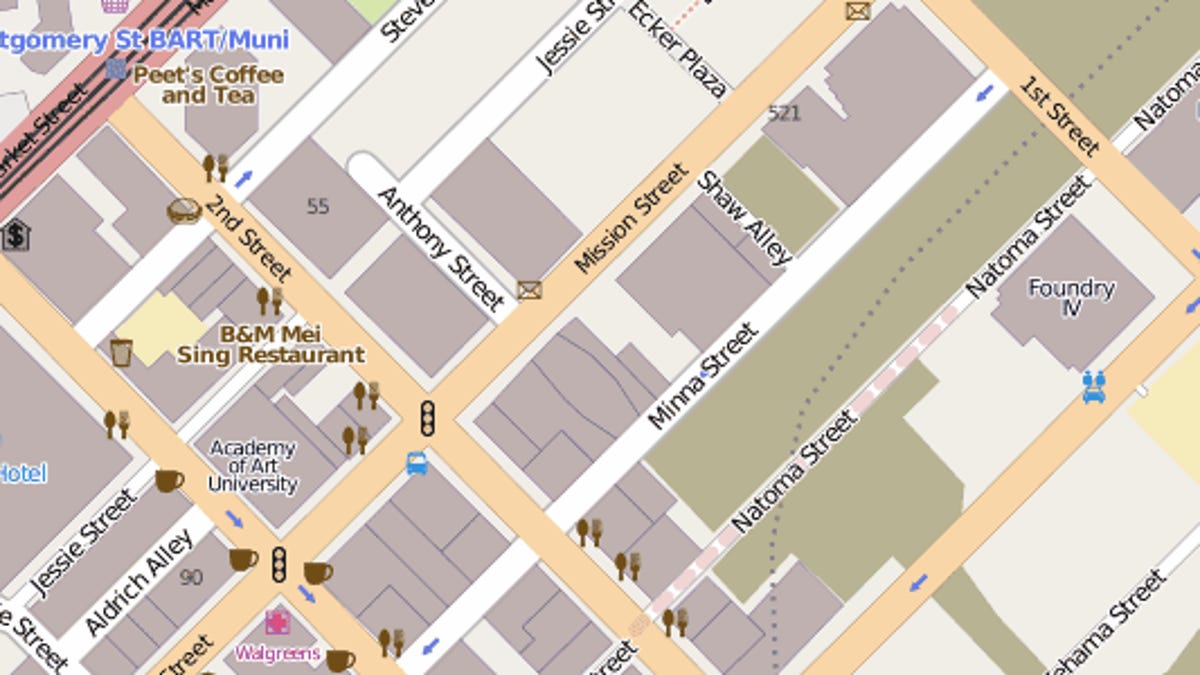Did Google-run computers taint rival mapping project?
OpenStreetMap says people using Google computers reversed one-way street directions and otherwise "vandalized" map results. Google says contractors acting on their own were to blame.

OpenStreetMap organizers said computers using a Google Internet address have been tainting its cooperative mapping project.
"Preliminary results show users from Google IP [Internet Protocol] address ranges in India deleting, moving, and abusing OSM data including subtle edits like reversing one-way streets," according to a blog post yesterday from OpenStreetMap founder Steve Coast, OSM sysadmin Grant Slater, and OSM Foundation board member Mikel Maron.
An analysis of data reveals that the activities were from the "same source" as a problem that came to light last week involving improper use of data from a Kenyan online business directory called Mocality, the OSM representatives said. Google apologized for the Mocality problem, saying that a "team of people working on a Google project improperly used Mocality's data and misrepresented our relationship with Mocality." Mocality set up something of a sting operation to document exactly what was going on.
Google had this to say about the OpenStreetMap incident:
The two people who made these changes were contractors acting on their own behalf while on the Google network. They are no longer working on Google projects.
And a source familiar with Google's actions said the two were terminated because they used Google's network for unauthorized activity, which is against Google's rules, not because of what they actually did on their own initiative. The two made only 20 edits to the OSM data, this person said.
Organizing such actions seems a very un-Googley way to compete. The bigger Google gets, though, the more room there is for high-profile human error.
Others were inclined to find error elsewhere. Tom Hughes, OSM's system administrator, pointed a finger at the OSM representatives: "As the person who (in my role as an OpenStreetMap system administrator) first discovered this 'incident' let me start by saying that I consider this post to be grossly irresponsible and wholly inappropriate," Hughes said in a comment to the post. He added that the authors:
are making mountains out of tiny pimples here. It seems that they want this to be some sort of organized corporate malfeasance on the part of Google which is why they have tried to link it to the recent Mocality incident where there was indeed clear evidence of such behavior.
The reality in this case is that there is no evidence that this is any different to the numerous other incidents we get all the time where users either accidentally or deliberately make bogus edits. The only difference in this case is that there happen to be two accounts (though we do not know if that is two people) and the user or users involved happen to (presumably) work for Google.
The vandalism came from two Google IP addresses, the OSM representatives said, but more have been involved with OSM.
"Two OpenStreetMap accounts have been vandalizing OSM in London, New York, and elsewhere from Google's IP address, the same address in India reported by Mocality," the OSM representatives said. "The most obvious vandalism started around last Thursday last week from these particular users, however, it may take us some time to do a full analysis. In fact over the last year we have had over 102,000 hits on OSM using at least 17 accounts from this Google IP."
As ReadWriteWeb observes, the Open Street Map project already has had to deal with a lot of what project co-founder Coast called "poisonous people."
Google Maps competes with OpenStreetMap, not just in real-world use but in accepting volunteer contributions of mapping data such as street location information. But OSM said Google actually has helped out OSM.
"These actions are somewhat baffling given our past good relationship with Google which has included donations and Summer of Code work," in which Google funds students to produce open-source work, the OSM representatives said. "As a community we take the quality of our data extremely seriously and look forward to an explanation from Google and an undertaking to not allow this kind of thing to happen in the future."
Updated 10:21 a.m. PT and 11:03 a.m. PT with Google comment and with comment from OSM sysadmin Tom Hughes.

